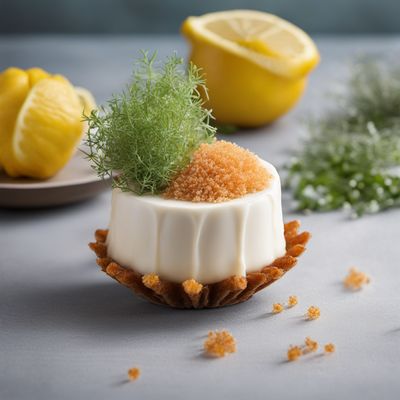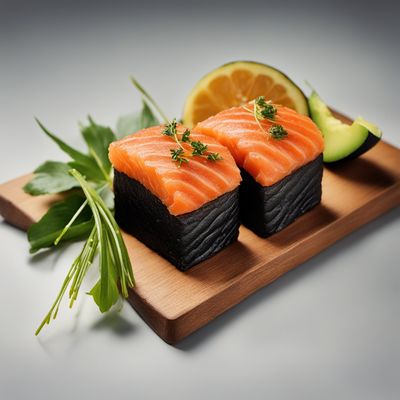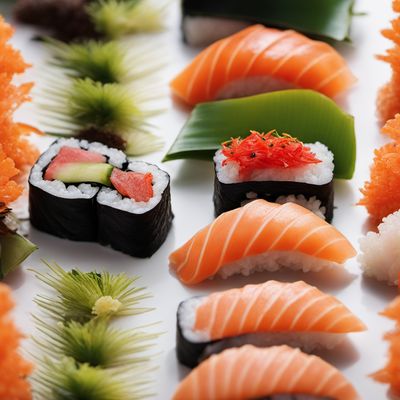
Ingredient
Sea urchins
The Ocean's Delicacy: Exploring the World of Sea Urchins
Sea urchins are spiny marine creatures that belong to the echinoderm family. They have a round or oval-shaped body covered in sharp spines, which protect their soft and delicate inner flesh. The color of their spines can vary from purple to green or black. Inside the sea urchin, there are five bright orange or yellow lobes, known as roe or uni, which are the edible part of the creature. The roe has a creamy and custard-like texture, with a rich and complex flavor that is often described as a combination of briny, sweet, and buttery notes. Sea urchins are considered a delicacy in many cuisines around the world.
Origins and history
Sea urchins have a long history of consumption, dating back to ancient times. They are found in oceans worldwide, with notable populations in coastal regions of Japan, Mediterranean countries, and the Pacific Northwest of the United States. In Japan, sea urchins have been enjoyed for centuries and are a staple in traditional sushi and sashimi. In Mediterranean cuisine, sea urchins are commonly used in pasta dishes and seafood stews. They have gained popularity in recent years in Western cuisine, particularly in upscale restaurants, where they are used to add a touch of luxury to various dishes.
Nutritional information
Sea urchins are a rich source of protein, omega-3 fatty acids, vitamins (such as vitamin A, B12, and C), and minerals (including calcium, iron, and magnesium). They are low in calories, with approximately 70-100 calories per 100 grams, making them a nutritious choice.
Allergens
Sea urchins may cause allergic reactions in individuals with shellfish allergies.
How to select
When selecting sea urchins, look for those that are still alive, with intact spines and a vibrant color. Avoid sea urchins that have a strong fishy odor or appear dried out. The spines should be firm and not easily breakable. If purchasing sea urchin roe, choose ones that are plump and have a bright orange or yellow color.
Storage recommendations
Sea urchins are highly perishable and should be consumed as soon as possible after purchase. If necessary, store them in a cool place, such as a refrigerator, with a damp cloth covering them to prevent them from drying out. It is best to consume sea urchins on the same day they are purchased for optimal freshness.
How to produce
Sea urchins are typically harvested from the ocean, making them challenging to produce on a small scale. However, some aquaculture farms have successfully cultivated sea urchins by providing suitable oceanic conditions and feeding them a controlled diet.
Preparation tips
To prepare sea urchins, carefully crack open the shell using a pair of kitchen shears or a sharp knife. Gently scoop out the roe with a spoon, being cautious not to break the delicate lobes. Rinse the roe under cold water to remove any debris. Sea urchin roe is often enjoyed raw, as a topping for sushi or sashimi, or incorporated into pasta dishes, risottos, or seafood sauces to add a luxurious touch. The roe can also be lightly cooked by sautéing or steaming, but be careful not to overcook it, as it can become rubbery.
Culinary uses
Sea urchins are commonly used in Japanese cuisine, where they are enjoyed raw as a topping for sushi or sashimi. They are also used in pasta dishes, such as sea urchin spaghetti, where the roe is mixed with olive oil, garlic, and chili flakes. Sea urchin roe can be incorporated into seafood sauces, risottos, or used as a garnish for seafood dishes to add a unique flavor and texture.
Availability
Sea urchins are commonly available in coastal regions worldwide, including Japan, Mediterranean countries, and the Pacific Northwest of the United States.
More ingredients from this category
Recipes using Sea urchins

Uni Gunkan Maki with a Twist
Ocean Delight: Uni Gunkan Maki with a Burst of Flavors

Spaghetti with Sea Urchin Sauce
Oceanic Delight: Spaghetti with Creamy Sea Urchin Sauce

Mauritanian-style Sea Urchin Noodle Soup
Savory Delight: Mauritanian Sea Urchin Noodle Soup

Sea Urchin Foam
Ocean Bubbles: Sea Urchin Foam Delight

Erizos con salsa verde
Sea Urchins with Green Sauce: A Delightful Spanish Seafood Delicacy

Uni and Avocado Tartine
Sea Urchin Delight: Uni and Avocado Tartine

Sicilian Style Sea Urchin Spaghetti
Savor the Sea: Sicilian Style Sea Urchin Spaghetti

Latvian-style Sea Urchins with Green Sauce
Baltic Delicacy: Latvian Sea Urchins with Zesty Green Sauce

Uni Nigiri Sushi
Ocean Delight Nigiri: A Taste of Japan's Sea

Uni Chawanmushi with a Twist
Velvety Delight: Uni Chawanmushi with a Burst of Flavor